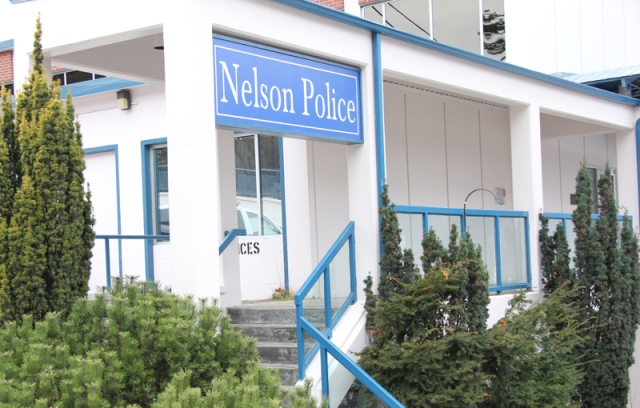Police board make request for 8.7 per cent rise in budget
The city’s police board has come to the municipal table and has once again asked for a significant budget increase, looking for an 8.7 per cent budget rise to almost $3.2 million.
In 2015 the Nelson Police board asked for a similar increase, one which was denied by council and was subsequently appealed by the board, landing on the desk of the provincial director of Police Services that ruled in favour of an increase.
This year the annual provisional budget request has topped the $3 million mark for the first time at $3,178,291. The actual increase in the budget request over last year is approximately $253,763, or 8.7 per cent and includes the increase of one sworn member, one civilian member and an anticipated general salary increase, as well as funding for the restorative justice coordinator.
Chief constable Paul Burkart presented the budget, along with police board directors Liz Edwards, Am Naqvi and Hilda Taylor, to city council on Monday night in council chambers. The presentation is an annual legislated requirement, with the budget ultimately requiring council’s approval.
Although wages and benefits for police have risen 38 per cent in the last 10 years the city’s police officers are still the lowest paid of the municipal departments, said Burkart. Wages and benefits currently represent approximately 86 cents out of each budget dollar given to the NPD.
And this year’s request is an attempt to fulfill the ruling of the provincial Police Services director earlier this year.
“It is a significant ask this year, but it does cover those positions that were approved last year in the Police Services (ruling),” said Burkart.
He also pointed out that, despite the increase requested, several factors are expected to further stress the NPD budget in 2017, including increased costs for mandated training for all officers to minimize liability, increasing costs of the ongoing provincial policing standards review and potential costs associated with a new radio system.
In addition, negotiations over the expired collective agreement for sworn NPD personnel are still ongoing, and could significantly increase staffing costs once complete.
“It is important for council to realize there has been no collective agreement with police and with fire, for (several) years, so those are issues we need to resolve,” said Colin McClure, the city’s chief financial officer, during the presentation.
In Nelson, with the requested 2017 budget increase, the average cost per member is estimated at $182,732 — with a per capita cost of $312 (based on 10,532 people in the city).
Nelson’s case load of 50 per member is high in comparison with other independent municipal police services such as Central Saanich’s case load of 19 and Oak Bay’s case load of 21, Burkart noted. And calls for service are up slightly (year-to-date).
However, Burkart pointed out that the NPD polices more people than they are funded for by taxpayers alone, using an “urban” rather than “rural” style of policing that would befit a community of just over 10,000 people.
He explained that the police provide a tremendous amount of centralized “core” services for a great number of marginalized citizens, many of whom do not live in Nelson. The NPD’s street, bridge and traffic studies have shown the department polices a population of approximately 16,000 citizens (and more, depending on the season) on a daily basis.
“If we did factor in the core city phenomenon, that would mean a citizen per officer rate of 888 citizens as opposed to the 585,” current rate, read the board’s report to council.
In addition, the NPD works with one of the highest crime rate and highest case loads per officer of all independent police services in B.C., the report noted. The NPD’s 18 authorized strength officers are more than Castlegar (13) and Trail (14), but deal with significantly more Criminal Code offences at 856, compared to 218 in Castlegar and 693 in Trail.
However, on a case-load-per-officer basis, Nelson’s rate of 50 equals Trail at 50, but much higher than Castlegar at 17.
“So we need our police officers on the street, that’s what it comes down to,” said Burkart. “We are a very busy little community here.”
But the NPD’s budget has gone up every year since 2006, save for last year’s 2.3 per cent decrease. Last March the province recommended a staffing increase for the city’s police department, but there wasn’t a corresponding rise in taxation to cover the new positions of one additional police officer and an administrative position.
The report delivered by the director of Police Services, Clayton Pecknold, to city council and the Nelson Police Department board was a binding decision, but fell short of the two officers the police board had originally asked for in 2015. The department instead filled three vacancies caused by two retirements and a resignation.
Although the decision did not exactly provide what the police board had asked for in its 2015 provisional budget, the NPD had taken steps to augment its strength on the street with the placement of a fulltime beat officer, accomplished through revamping the department’s management structure.
With the change, the NPD was able to realize some cost savings that were used to augment some of the costs of the new positions in 2016.
Pecknold was charged with making a declaration on the minimal staffing required in Nelson under the B.C. Police Act, after the Nelson Police Department’s budget request for $311,000 — for two additional officers and one administrative position — was denied by city council in fall of 2015.
The NPD request cited an increase in workload as the reason for the staffing increase.
The review began when the Nelson police board voted to appeal city council’s decision to deny the extra funds to the province under a rarely used provision of the B.C. Police Act.
The police had not added any officers in over 20 years and former chief constable Wayne Holland had explained to council that the workload for NPD officers — particularly the handling of mental health cases — had increased in the last few years.
A consultant hired by Pecknold to author an audit of the NPD’s request filed his report late last year, with a final decision coming in March.

























